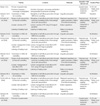Abstract
Purpose
The purpose of this study was to examine the effects of self-efficacy promotion programs on self-efficacy, self-care behavior, and quality of life in breast cancer patients receiving radiation therapy.
Methods
This study was conducted from November 1, 2009 to December 10, 2010. A total of 39 breast cancer patients, who received radiotherapy in a University hospital located in city B, participated in the study and were divided into two groups (experimental group 17 and control group 22). The data were analyzed with the χ2-test and ANCOVA using the SPSS/Win 17.0 program.
Results
Self-efficacy promotion programs aimed at self-management were effective in enhancing concrete self-efficacy but not effective in promoting general self-efficacy, self-care behavior, and quality of life among breast cancer patients who have received radiotherapy.
Conclusion
Organizing a support group for the breast cancer patients seems to be highly necessary to help themselves obtain higher level of specific self-efficacy, self-care behavior, and quality of life in general. It will also be beneficial for the breast cancer patients to understand their unique situations and improve their health problems for themselves.
Figures and Tables
Table 2
Homogeneity Test of General & Disease Related Characteristics between Experimental and Control Group (N=39)

Table 3
Homogeneity Test of Independent Variables between Experimental and Control Group before Treatment (N=39)

References
1. Korean Breast Cancer Society Policy Committee. Breast cancer facts & figures 2006-2008. 2008. Seoul: Korean Breast Cancer Society.
2. Korea Central Cancer Registry. Annual report of the Korea central cancer registry 2006-2007. 2009. Seoul:
3. Yang JH. A Study on Health Behavior Experience of Middle-aged Women in Rural Area. J Korean Acad Nurs. 2002. 32:694–705.

4. Kim SJ. Nursing thories. 1987. Seoul: Soomoonsa.
5. Bandura A. Social foundation of thought and action: a social cognitive theory. 1986. Englewood Cliffs, NJ: Prentice-Hall.
6. Yu SJ, Song MS, Lee YJ. The Effects of self-efficacy promotion and education program of self-efficacy, self-care behavior, and blood pressure for elderly hypertensives. J Korean Acad Adult Nurs. 2001. 13:108–122.
7. Kam SH. The Development and effect of self-efficacy promotion program on self-care of hemodialysis Patients. 2003. Busan: Busan National University.;[dissertation].
8. Yang YH. Trajectory of fatigue, quality if life and physical symptoms in cancer patients receiving radiotherapy. J Korean Acad Nurs. 2003. 33:562–569.

9. Kim SJ. Development and effects of the self-efficacy promotin gprogram for prevention and early detection of gastric cancer in industrial workers. 2002. Busan: Kosin Univ.;[dissertation].
10. Kim MY. Development and effects of a web-based self-efficacy promoting program on stomach cancer patients with gasterectomy. 2008. Busan: Kosin Univ.;[dissertation].
11. Yang YH, Lee JK. The effect of cancer overcome program using strategy for promoting self-efficacy among family caregivers with lung cancer in Korea. J Korean Acad Adult Nurs. 2006. 18:395–404.
12. Han SH. The effect of exercise program with strategies promoting self-efficacy on health status and exercise capacity in patients after the stem cell transplantation. 2007. Seoul: Yonsel Univ.;[dissertation].
13. Kang SS. Radiation therapeutics. 2007. Seoul: Chunggumunhwasa.
14. Sherer M, Maddux JE, Meracn dnte B, Prenitice-Dunn S, Jacobs B, Roges RW. The self-efficacy Scale: construction and validation. Psychol Rep. 1982. 51:663–671.

15. Oh PJ, Lee EO, Tae YS, Um DC. Effects of a program to promote self-efficacy and hope on the self-care behavior and the quality of life in patients with Leukemia. J Nurs Acad Soc. 1997. 27:627–638.

16. Orem DE. Nursing concepts of practic. 1991. 4th ed. St Louis: Mosby-Year Book Inc.
17. Dodd MJ. Measuring informational interventions for chemotherapy knowledge & self-care behavior. Res Nurs Health. 1984. 7:43–50.

18. Suh SR. An effect of self-care education and level of resourcefulness on active coping in patients with chemotherapy. 1996. Seoul: Seoul National Univ.;[dissertation].
19. Kim JY. Effect of structured patient education on sife-effects of chemotherapy patients and self-care. 1998. Busan: Kosin Univ.;[dissertation].
20. Tae YS, Kang ES, Lee MH, Park GJ. Development of quality of life measurement for cancer patinets. J Korean Acad Adult Nurs. 2000. 12:741–757.
21. Bandura A, Adams NE, Hardy AB, Howells GN. Tests of the generality of self-efficacy theory. Cogn Ther Res. 1980. 4:39–66.

22. Song MR. The development and effect of self-efficacy promotion program in self-care of hemodialysis patients. 1999. Seoul: National Seoul Univ.;[dissertation].
23. Kim JI. An Effect of aquatic exercise program with self-help group activities and strategies for promoting self-efficacy on pain, physiological parameters and quality of life in patients having rheumatoid arthritis. 1994. Seoul: Seoul National Univ.;[dissertation].
24. Lee HJ. The effects of a self-efficacy enhancing exercise program on the physiological function, self-efficacy and life satisfaction of essential hypertensibe females. 2002. Seoul: Seoul National Univ.;[dissertation].
25. Gu MO, Yu JS, Kweon IK, Kim HW, Lee EO. A Review of Research on Self Efficacy Theory Applied to Health Related Behavior. J Korean Acad Adult Nurs. 1994. 24:278–302.

26. Lee HS. The effect of individualized education and telephone counseling on self-care knowledge, self-efficacy and performance in chemotherapy patients. 2009. Kungnam: Kungsang Univ.;[thesis].
27. Choi JS. Predictive factors of quality of life in mastectomy patients. 2008. Busan: Kosin Univ.;[thesis].




 PDF
PDF ePub
ePub Citation
Citation Print
Print







 XML Download
XML Download